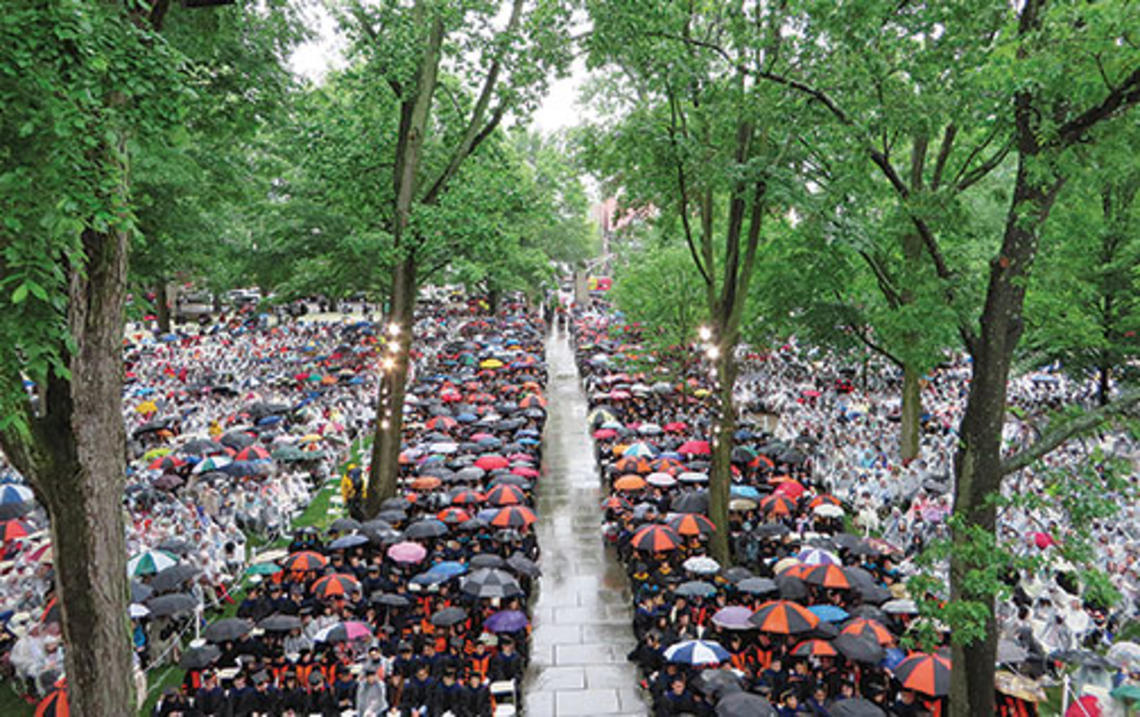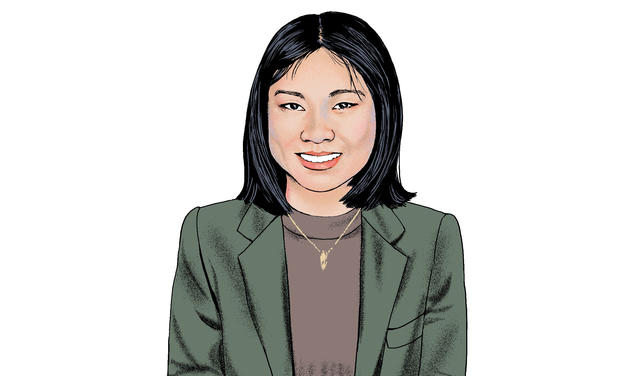Commencement: For ’15, Rainy Farewell
Graduates urged to ‘dream audaciously’ on the path beyond FitzRandolph Gate

A steady shower persisted throughout Princeton’s 268th Commencement ceremony, with graduates and guests wearing rain ponchos and holding umbrellas as they sat through the speeches and granting of degrees. Rising to give the traditional address, President Eisgruber ’83 was merciful. The “weather machine” that had provided sunny weather during Reunions weekend had broken, he joked, and so he would deliver just three paragraphs of his planned talk.
In that excerpt, he urged the graduates to “dream audaciously.” While acknowledging that they will have to do mundane things like find apartments and pay rent, he said he hoped they would pursue ideals that are “beautiful and profound.”
His planned remarks — Eisgruber encouraged graduates to read them on Princeton’s website — were more pointed, linking the “orange bubble” to the world’s most pressing challenges and reminding the departing students of their role in addressing them. He noted police killings of unarmed black men in the past year, and the student-led protests against racism that “carried forward a tradition of political engagement on this campus that is more than two centuries old.”
He cited Frederick Douglass’ “utterly audacious dream — the dream that all of us, despite our differences and our conflicts and our sins against one another, could come together as one people.” He pointed out that the University’s trustees had just voted unanimously to approve departmental status for African American studies.
Eisgruber also referred to Alan Turing *38, whose graduate work at Princeton helped him decrypt Germany’s Enigma cipher in England during World War II, shortening the war. Noting that Turing was forced to repress his identity as a homosexual man, the president mentioned legal decisions that have made the United States a more tolerant place and hoped for “a day when all Americans can express their sexual identities freely and without fear of discrimination or violence.”
The University awarded 1,268 undergraduate degrees (972 A.B. degrees and 296 B.S. degrees in engineering) and 885 graduate degrees (371 Ph.D.s and 514 master’s degrees).
At the Baccalaureate service, Lisa P. Jackson *86, vice president of environmental initiatives at Apple and former administrator of the Environmental Protection Agency, described how the Class of 2015 “has seen controversy, whether it was the reaction to the die-in on campus, or issues of equality of the sexes or income inequality.” Ideally, she said, the result would have been “deeper understandings of each other, and a powerful feeling of common purpose and passion. But I’m guessing it’s more likely that you are still processing all that you’ve seen and experienced.”
As a graduate student at Princeton, Jackson said, she found “far fewer kids of color or other students who had shared my experience” and that she felt “like this was someone else’s university and I was being allowed to attend.” But she had the support of friends, she said, who “helped me realize that not getting a Ph.D. in engineering wasn’t a failure, it was just a change in course [she received a master’s degree]. And I think that’s my first lesson. ... It’s really important to know the difference and to give yourself permission to change course, to pursue what’s right for you.”
For ’15, Rainy Farewell | Parting Words | Special Graduations | Spotlight on Batman | Graduation: What it Cost | At Hooding Event, a Faculty Role | General’s Welcome for New Officers | Honorary Degrees | Slide Show










0 Responses